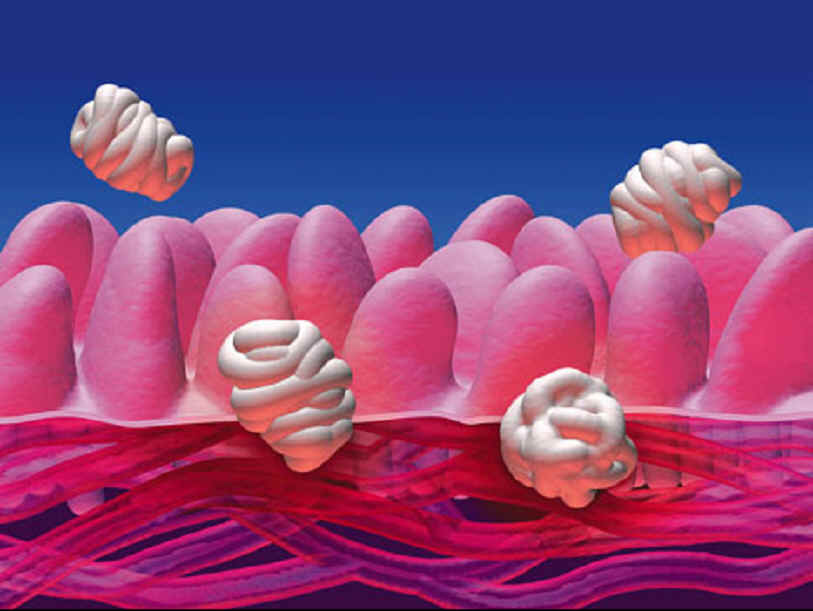Food intolerance is on the rise: Some estimates say that up 80 percent of people have IgG food allergies. Should you be concerned if you don’t even know? Ignorance is bliss, right? Wrong. Would you believe that food sensitivities can cause or worsen health issues such as irritable bowel syndrome, acne, seasonal allergies, or even hormonal imbalance? This is one of the major issues I help people confront in my private nutrition practice.
When you think food allergy, you probably think of eating something that suddenly causes your throat to close up, sending you to the hospital. This is a true type of food allergy called an IgE response and is classified as a hypersensitive severe immune reaction that may affect the respiratory tract or circulatory system. These food allergies are very serious, and you probably know which foods to avoid if this is you. Most common are nuts and shellfish in this case.
There is another type of food allergy that is more insidious and may take up to 72 hours to surface. This is a delayed food allergy & is technically a food sensitivity, an IgG response, which refers to the IgG antibody, the largest circulating antibody in your system. What happens in this situation is that the IgG antibody marks certain food particles as antigens, and when you eat these foods (take wheat, for example), the body mounts an immune response and attack in response. Anytime you eat wheat, you experience allergic reactions such as bloating, hay fever symptoms, rash, headache, etc. These sensitivities can be passed from mother to child or can develop over time.
Let’s say you have an inborn dairy sensitivity and you don’t know it. The more you consume dairy, the more inflamed your digestive tract becomes. Your digestive tract is very permeable, and holes can actually develop, and food particles can leak through. They are released into your bloodstream, where they are marked as foreign invaders and attacked.
So, every time you eat that food, your body mounts an immune attack, and you experience symptoms. This is one reason why you may develop food sensitivities to foods you eat on a regular basis (more chance they will leak through the gut) and a reason why you should rotate foods in and out of your diet and strive for variety. Don’t eat the same things every day. There is also a connection between food sensitivities & food addictions and cravings–you are often addicted to the foods you are sensitive to because along with the immune response that is launched when you eat said food, your body releases endorphins as a response to the damage taking place. So you literally get a high from eating that food. If you get a pleasurable or drugged feeling from eating certain foods, or you crave them, you could have a sensitivity to those foods.
Common food sensitivity symptoms include gas, bloating, hay fever/runny nose/sinus issues, skin issues, joint pain, fatigue, brain fog, insomnia, rheumatoid arthritis, headache, IBS, Chron’s, heartburn, diarrhea, constipation. Every time you eat a food you’re sensitive to, it creates inflammation in your digestive tract, making you more susceptible to yeast & bacteria overgrowth and parasites, which cause sugar cravings, weight gain, and systemic problems like hormonal imbalance.
To prevent developing food sensitivities
- chew slowly & thoroughly.
- Practice a rotation diet: don’t eat the same things every day. Variety is key!
- Keep your digestive tract in top shape by taking probiotics to foster good bacteria in the gut. Too much bad bacteria causes leaky gut. You can develop food sensitivities over time from dysbiosis in the gut (bad bacteria overgrowth) by eating too much sugar, antibiotic use, too much alcohol or poor diet. The digestive tract gets inflamed from the dysbiosis and food particles can leak through. It can be a vicious cycle: poor diet –>dysbiosis–> leaky gut–> food sensitivities–> further digestive tract inflammation –> worse leaky gut –> more food sensitivities. The good news is that leaky gut can heal & food sensitivities can go away if you remove the food for 6 months or more.
I have mixed feelings about food allergy testing accuracy, but you can also do a self test to save money. Your symptoms are the surprisingly accurate results that indicate if you have a food intolerance! Remove any food you suspect from the diet for 14 days. Add it back in on day 15 and eat as much as you want of that food, then see if you experience any of the above symptoms. The most common food sensitivities are eggs, milk, wheat/gluten, soy, citrus, shellfish, nuts, and sometimes beef. Do you have food sensitivities? If so, how have you worked your diet around it?

Mary Vance is a Certified Nutrition Consultant and author specializing in digestive health. She combines a science-based approach with natural therapies to rebalance the body. In addition to her 1:1 coaching, she offers courses to help you heal your gut and improve your health. Mary lives in San Francisco and Lake Tahoe in Northern California. Read more about her coaching practice here and her background here.







Very interesting article thank you. I must now go and think about any foods that have made me high after eating them. 🙂
I became allergic to so many foods 4 years ago. My throat swelled for a month and then I was able to eat for a couple weeks before my esophagus narrowed and I could no longer eat again. I had to live on a liquid diet, but even then the liquids I was consumming I was allergic to, so the liquid would stall in my throat for hours. Essentially, I starved for a total of 6 months before I took the ALCAT test and found out all of my allergies/sensitivities. But even though I was able to eat solids within a week, I ended up in a catabolic state from not properly digesting my food. I have had acute and severe pancreatitis, my gull bladder was tested at working at 4%, and I’ve dealt with acute kidney for the last 2 years. I’m not sure if it’s acute anymore, I was only hospitalized once, and since then I’ve monitered my electrolytes pretty well, but due to my B12 and vitamin D deficiencies, I’ve dealt with an electrolyte imbalance on a daily basis for 2 years. I drink vegetable water from veggies I boil daily throughout the day when I feel weak or when I don’t digest my food well. Any ways, I still have reactions in my throat. It varies, some reactions are scarey while other ones are just enough to let me know not to eat the food. I have been able to get away with some foods I couldn’t eat before, but I can tell I’m still a bit sensitive to them. It’s been 4 years, I don’t understand why it is taking so long. Is there any more adv ice you can give? I still struggle with my energy on a daily basis. My digestive system is so weak, sometimes I have to sit in the shower if I overate before getting in. I burp all the time, and my food takes so long to digest. Yet because I have so many allergy/sensitivites, my diet is truely very limited. I eat really healthy. I do like gluten-free breads and chips when my digestive system allows, but I try to stay as much away from sugar as possible.
Multiple food allergies cause a lot of inflammation in the digestive tract that contributes to malabsorption (leading to deficiencies because you are not absorbing all the nutrients from the food you eat). The inflammation also leads to leaky gut syndrome, which can put you at risk for auto immune diseases and cause a lot of digestive distress. It’s possible also that you have bad bacteria overgrowth or parasites that are contributing to the maldigestion issues. Digestive inflammation is a huge stress on the body, which can tax adrenals and lead to fatigue. I can offer guidance about the best course of treatment if you’d like to contact me for more info: info@maryvancenc.com
Good luck!
I forgot to say that I was told by a doctor and by a chiropractor that it appeared I was dealing with leaky gut syndrome during my first year of this illness. I am not sure what the signs and symptoms are anymore. I know back then I researched it and delt with it in the best way I could. I used to take all kinds of vitamins and suppliments, but I stopped 2 years ago after I became vegan. I am no longer vegan anymore, I only became that way because of my gull bladder. I literally couldn’t swallow meat of any kind, not even if I liquified it, but I am able to digest much better. When I first added meat back into my diet I got gastritis, however I stayed eating meat anyway because it lifted my mood and energy. And within the past few days I’ve had to get off of my digestive enzymes. I guess I do not need them anymore because I started to feel like they were eating my insides so I would eat and eat and eat just to take that feeling away. After the 2nd or 3rd time that happened I realized I probably don’t need them anymore. Are there any tests to check my gut bacteria? I still deal with electrolyte problems. I have been loosing sleep because my kidneys have been feeling bad since Thanksgiving. However I just saw a doctor the Monday before Thanksgiving complaining about how I deal with it every day, but he said my blood test came back normal. I have been drinking dairy free egg nog, which is high in sugar, it’s the only thing with sugar that I allow myself to ingest. I do still have a sugar addiction. Before Thanksgiving I bought two boxes of cookies, one for Thanksgiving and one for Christmas. Instead, I ate both boxes in less than 24 hours. So, no cookies or dessert this year. -At least none with sugar. (I do like to bake with maple syrup.)
I am interested in hearing more info about this gut syndrome and how I can take care of it. I suffer alot w gi disorder and can’t seem to shake endometriosis. I feel terrible on a daily basis and need a direction to go. Thanks
https://www.maryvancenc.com/2013/01/heal-leaky-gut-naturally/
Another food sensitivity that is becoming more frequent is corn. Very hard to eliminate. It is in almost every processed food and corn starch is in every paper product. That could be your culprit Vanessa. I also have had a feeling of a lump in my throat and sometimes it feels like my throat swells some when eating and some GERD, ibs. A doc I found ordered IGg testing and found I was highly sensitive to corn and sensitive to alot of other foods. Stool samples showed candida, and some bad bacteria. Talk to him tomorrow to see what I do from here other than diet which isn’t helping too much( but some at times). Keep searching. Regular MDs don’t know …my Gastro doc said to come back if I felt worse. There was nothing he could do.. So I found someone else.